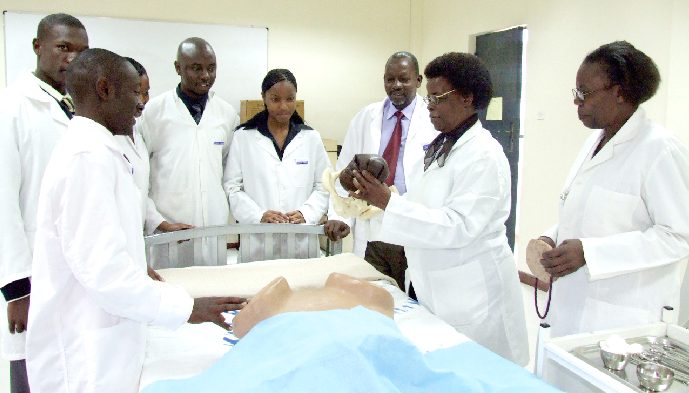
A pioneering model in science education across the districts
It was not possible for me to respond to the numerous requests for TV and Radio interviews when the political parties introduced their manifestoes on education. (My apologies to those producers who called).The next best thing was to introduce the current topic, and to give an idea of the opportunities we keep missing in Ghana which education can revive. Quality purposeful education is a serious matter: It is not a political game of cut and paste manifestoes to fill airtime with promises.
When political parties introduce their manifestoes, they send their constituents on hopeful journeys in search of progress. The plans that party leaders send messages about become the focus of what should be of most concern to the nation; they are supposed to give hope first, and hands-on action thereafter. The plans measure how forward looking, relevant, and serious the parties are about their espoused beliefs for the nation.
The visions and values from the issues set the agenda for the nation. From that point alone, it’s been deduced time and again that where there’s no vision a people perish; and that answers the question posed in the Ghana Education Service (GES): Why are some nations rich and others poor? Serious nations are discerning, innovative, and practical; they add value to the possibilities around them.
Science education
The quest for self-sufficiency ruled my thoughts when I visited the Northern Region to do a Pre-Service Teacher Training for a leadership and skills institute at Nalerigu, in the Mamprusi District. Thereafter, in a presentation I designed for the Parliamentary Select Committee on Education for the “Education Strategic Plan 2010 – 2020” at Koforidua ( May 11-12, 2013), I stressed to the MPs assembled that all districts are not endowed in the same way; and so one size of science education does not fit all. In the Mamprusi District, for example, cotton, shea-butter, and various fruits grow naturally, and they needed to be incorporated as science projects to support students’ enlightenment in the area as a prelude to bona fide agricultural inputs for scaled industries.
Observations in other regions suggested that school projects in each district must be promoted and tailored to fit its local contents. Cottage industries, for one, start with local content. In the Savelugu / Nanton District, rice cultivation in the Nabogu Valley should feature strongly as science projects for the youth there.
The North and South Nkwanta Districts must stress yams and legume production. In the Shamaa District - and other districts by water bodies - Tilapia and other fish farms should feature there. Those examples are just samplers for starters, but at the end of the day, the districts themselves must be in much better positions to identify their comparative advantages and peculiarities and focus their energies, intelligence, and science projects there. Integrated science projects are already recommended in the Ministry of Education / GES syllabus; but we live in a country where everything is good on paper except the committed actions to get things done in productive ways.
Focus on the nation’snatural endowment
The national planning and manifestoes for educational transformation needed at this moment in Ghana must stand in some organic relationship with the natural endowment in each district; that is, every district must focus on its comparative strengths. The health of the nation itself depends on the health of the rural districts; and a useful manifesto must reflect this reality.
There is something inherently wrong with the collective national mindset when our natural resources are neglected and replaced with container loads of other people’s trash in the form of electronic wastes, broken appliances, and factory rejects. The very sight of Ghana’s youth pending such wastes as lifelong trades is a cause for concern. The right kind of education must begin to reflect on these hazards.
There are many nations without any visible natural resources of any kind – no gold, no bauxite, no cocoa, no diamonds, no oil – but purposeful education has provided them with some of the highest living standards in the world. For Ghana, so blessed with so much, it bugs the mind to see why after about 60 years of independence, the country continues to be so deprived.
Which party will lead by example?
Let’s take an example from Lee Kuan Yew, on how he sustained his manifesto to create an oases of excellence for the schools in Singapore. He said, “We educated [the] children in schools by getting them to plant trees, care for them, and grow gardens.” For the larger nation itself, he said, “I got the ministry of defense in charge of national servicemen, the ministry of education with half a million students under its care, and the National Trade Union Congress with several hundred thousand workers [to] make Singapore a pleasanter place for ourselves, quite apart from the tourist trade.”
Are our political leaders honestly prepared to engage all the nation’s employees go those extra miles to make a difference in the lives of the youth and the country itself? Knowing darn well that to see where any nation is going in the future, just watch how the nation treats her own children, will they now commit to building toilets and help provide water and toilet paper in each of the 14,000 or so basic public schools in the country as part of those manifestoes?
The manifestoes for the right kind of education must reflect on those hazards and offer actionable plans to address them within verifiable time frames.
Email:
Blog: www.anishaffar.org
